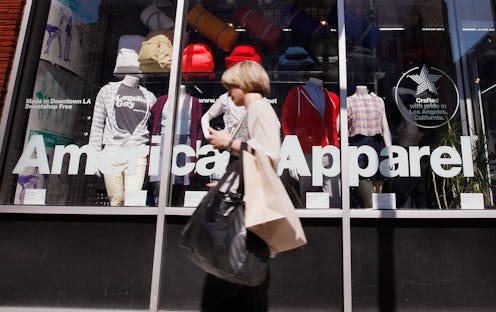American Apparel is known for running ads that are a least a little offensive (okay, usually more than just a little). The brand is pretty much built on barely-there clothing and scantily clad models. Now American Apparel is under scrutiny once again for its recently released mini skirt ad (sat up in your chair, didn't you?), and this time they really may have gone too far.
Now, if you're offended by nipples, pubic hair, or general nudity, the American Apparel campaigns aren't for you to begin with. The company thrives off of shock value and provocativeness, and it's no stranger to criticism of its advertising tactics. Generally speaking, the brand has made a name for itself by pushing buttons, especially recently. While American Apparel's ads may be questionable, in many ways they work. They get people talking about the brand and that's the point, right?
American Apparel even seemed to be heading in a much more positive (and equally bold) area of advertising when it chose to feature a 62-year-old model for its lingerie ads. Empowering women of all ages? Using different types of models than the standard? I can't argue with that.
However, this new American Apparel ad, released last week, may have done more damage than can be fixed with any positive steps forward. The new mini skirt ads, which feature a very thin, young-looking girl bent over in some sort of field, exposing her juvenile-looking panties are... just a little too much. Even trying to describe the ad feels gross.
Assuming that American Apparel's advertising is entirely based on carefully and dangerously straddling the line between bold and totally offensive, I think they may have stepped on the wrong side of the divide with this particular choice. The model seems to be young.... really young. Or at least she's certainly dressed like she is: the image brings to mind a school girl. And, without her face, she's stripped of an identity — what about that seems remotely okay?
Slightly offensive mannequins and site-wide mild nudity are something we can take with a grain of salt — or at least ignore to some degree. And even if I disagree with the general advertising tactic of the brand, I can still recognize that a lot of what they do works to a certain extent. But there has to be a line somewhere. And objectification is where that line is crossed.
Some standards of appropriateness in advertising still must exist, especially when it comes to featuring models that are purposely made to look young or purposefully underage. I don't feel empowered by ads like this, and that sounds like a problem to me.
